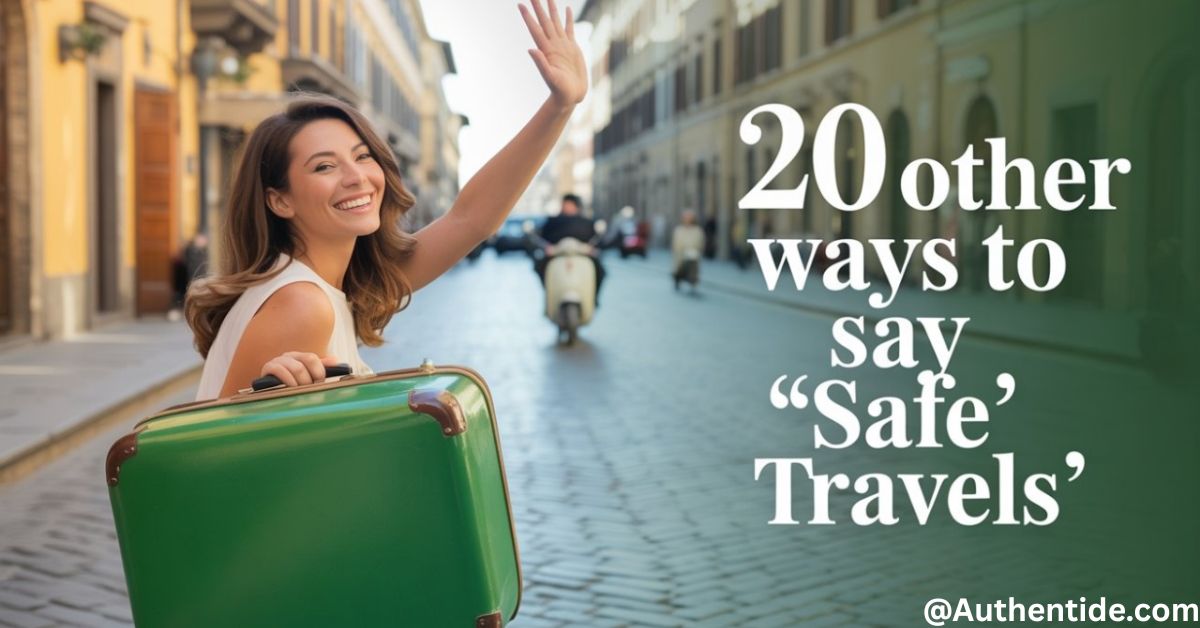Safe travels those two simple words carry so much weight when bidding farewell to friends, family, or colleagues embarking on a journey. In our increasingly mobile world, we’re constantly sending loved ones off on adventures both big and small, from daily commutes to international expeditions. Finding the perfect way to express our concern for their wellbeing can make all the difference in our business communication and personal connections.
The phrase “safe travels” has become our go-to expression, but sometimes we need something fresher, more personal, or better suited to specific relationships and circumstances. Whether you’re crafting a heartfelt email example to a departing colleague or texting a quick goodbye to a friend, having alternatives at your fingertips lets you personalize your well-wishes in meaningful ways that strengthen bonds across distances.
In this comprehensive guide, we will explore twenty thoughtful alternatives to “safe travels” that go beyond the ordinary. You will discover expressions ranging from casual to formal, brief to elaborate, and traditional to modern complete with real-world scenarios showing exactly when and how to use each phrase effectively. By expanding your travel well-wishes vocabulary, you will never be at a loss for words when saying goodbye to travelers in your life.
What to Say Instead of “Safe Travels”
- Have a safe trip
- Travel safely
- Have a good trip
- Have a safe journey
- Safe journey
- Wishing you a safe trip
- Have a pleasant trip
- Best wishes on your travels
- Wishing you a safe and enjoyable journey
- Have a smooth journey
- Safe and pleasant travel
- Take care on your trip
- Enjoy your travels
- Bon voyage
- Godspeed
- May your journey be smooth
- Wishing you safe passage
- Travel well
- May the road rise to meet you
- Stay safe and have fun
Is It Correct to Say “Safe Travels”?
Before diving into alternatives, let’s address a common question: is “safe travels” grammatically correct? Absolutely. Though it might seem like an abbreviated expression (short for “I wish you safe travels”), this phrase has become a perfectly acceptable idiom in English. The term functions as a journey blessing – a complete sentiment despite its brevity.
“Safe travels” works in virtually any context – whether you’re sending off a business associate, family member, or close friend. It strikes that ideal balance between expressing genuine concern without veering into overprotectiveness. The phrase has earned its place in our vocabulary precisely because it’s versatile, concise, and universally understood across cultures.
20 Other Ways to Say “Safe Travels” (With Example)
Here are 20 Other Ways to Say “Safe Travels” (With Example):
1. Have a safe trip
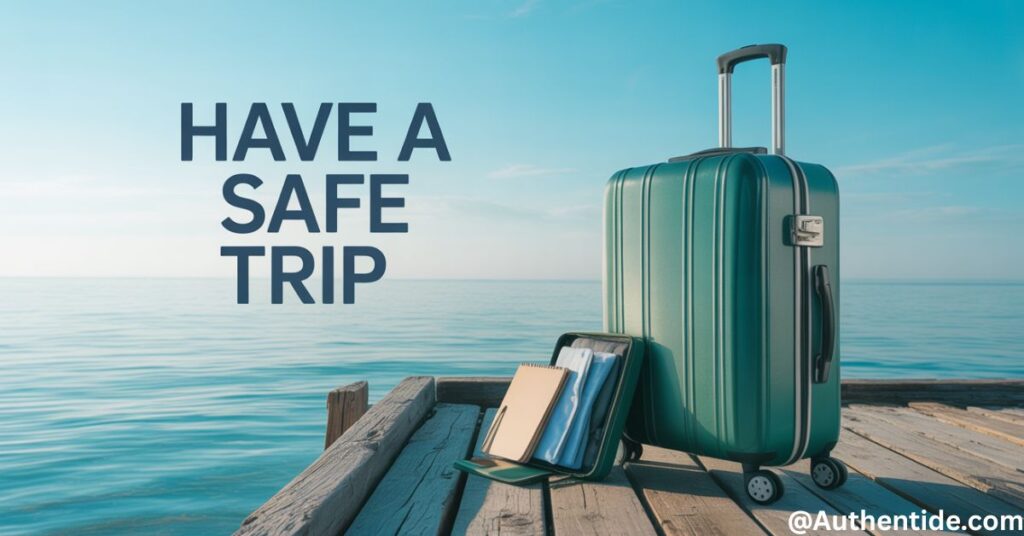
When you want to express genuine concern for someone’s well-being during their journey, “have a safe trip” offers a slightly more conversational alternative to “safe travels.” This phrase works beautifully in both casual and semi-formal settings.
Example in a text message: “The meeting’s all set for when you return next week. Have a safe trip to Chicago, and don’t forget to try that deep-dish pizza place I told you about!
Example in an email: “Dear Marcus, I’ve processed all the documents you requested before your departure. Have a safe trip to headquarters, and I look forward to hearing about the conference outcomes when you return. Best regards, Jenna”
2. Travel safely
“Travel safely” conveys the same sentiment as “safe travels” but uses active language that places more emphasis on the traveler’s actions. This slight shift makes it feel more personal and direct – you’re not just wishing for safety but encouraging careful behavior.
Example at an airport goodbye: “I’ve loaded your travel playlist with some new songs. Travel safely, call me when you land, and don’t forget we have dinner plans the day after you return!”
Example in a business context: “The client files have been uploaded to the secure server for your review during the flight. Travel safely to Singapore, and let’s reconnect for a debrief once you’ve settled in.”
3. Have a good trip
When you want to focus more on enjoyment than safety (perhaps for an experienced traveler or a vacation rather than a business trip), “have a good trip” shifts the emphasis to the quality of the experience. It’s upbeat and positive, perfect for leisure travel.
Example in a goodbye card: “Dear Sophia, We’ll miss your energy around the office, but we’re so excited for your adventure! Have a good trip exploring the Greek islands. We can’t wait to see pictures! From all of us in Marketing”
Example in a text: “Airport drop-off confirmed for 9AM tomorrow. Have a good trip to Bali! Don’t forget to bring me back one of those wooden masks we talked about. 🌴”
4. Have a safe journey
“Have a safe journey” carries a slightly more formal tone than “safe travels,” making it ideal for professional relationships or situations where a bit more gravitas is appropriate. The word “journey” elevates the expression.
Example in a work email: “Dear Dr. Reynolds, The research materials have been forwarded to your colleagues in Vienna. Have a safe journey to the conference, and we look forward to implementing your findings upon your return. Regards, The Research Team”
Example in a farewell message: “All the arrangements have been confirmed with the hotel. Have a safe journey to Barcelona, and remember the client prefers morning meetings. I’ve adjusted the schedule accordingly.”
5. Safe journey
When brevity is key, “safe journey” offers the perfect concise alternative. This shortened version works well in text messages, quick goodbyes, or as a closing line in communications. Despite its brevity, it still conveys genuine concern.
Example in a quick text: “Your train tickets are in the email I just sent. Safe journey! Call when you arrive.”
Example as a meeting closing: “That covers everything for the upcoming presentation in Dallas. The files are in the shared folder. Safe journey, and let’s regroup when you return on Thursday.”
6. Wishing you a safe trip
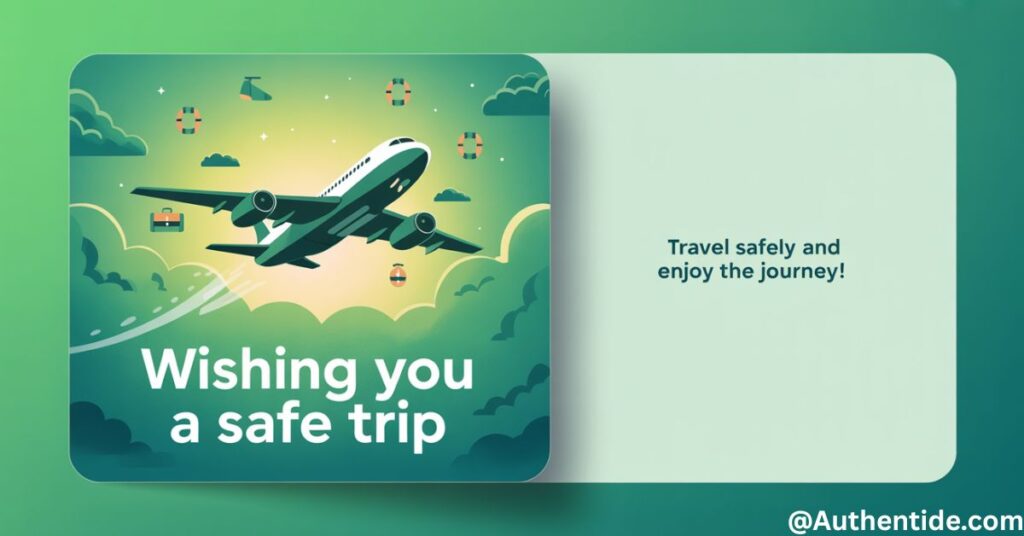
“Wishing you a safe trip” adds warmth and intentionality to your farewell. The addition of “wishing you” makes this phrase more personal and thoughtful, ideal for meaningful relationships or when you want to convey extra care.
Example in a family group chat: “Mom’s favorite snacks are packed in the blue bag. Wishing you a safe trip to Grandma’s house! Give her a big hug from me. ❤️”
Example in a farewell card: “Dear Alex, Wishing you a safe trip as you begin this new chapter abroad. Your courage in pursuing this international assignment inspires us all. The team won’t be the same without you! With admiration, Your colleagues at TechGrowth”
7. Have a pleasant trip
When you want to emphasize enjoyment over safety (perhaps for a low-risk journey or experienced traveler), “have a pleasant trip” focuses on the quality of the experience. It works well for both business and pleasure travel.
Example in a client email: “The reservation details have been forwarded to your hotel. Have a pleasant trip to the Tokyo office – I’ve included some restaurant recommendations near your accommodation that showcase authentic local cuisine.”
Example to a friend: “Your plant-sitting duties are officially on my calendar! Have a pleasant trip through wine country. Take lots of pictures and bring back stories (and maybe a bottle or two)!”
8. Best wishes on your travels
“Best wishes on your travels” offers a more formal, elevated alternative that works beautifully in written communication. This phrase carries a sense of ceremony, making it appropriate for significant journeys or professional relationships.
Example in a formal email: “Dear Professor Zhang, The department has processed your travel documents for the international symposium. Best wishes on your travels to Oxford. We look forward to hearing about the collaborative opportunities you discover. Sincerely, Dean Richardson”
Example in a goodbye card: “Dear Naomi, As you embark on your study abroad program, we couldn’t be prouder. Best wishes on your travels to Japan. This experience will transform your perspective in wonderful ways. With love, Mom and Dad”
9. Wishing you a safe and enjoyable journey
When you want to acknowledge both safety and pleasure, “wishing you a safe and enjoyable journey” covers all bases. This comprehensive phrase works well for important trips that combine business and leisure or for special vacations.
Example in a farewell email: “Dear Team, The conference materials have been uploaded to the shared drive. Wishing you a safe and enjoyable journey to the industry summit in Barcelona. I look forward to our debrief session upon your return. Best regards, Victoria”
Example to family members: “The house will be well-cared for while you’re away. Wishing you a safe and enjoyable journey as you explore Italy! Don’t forget to toss a coin in the Trevi Fountain for me.”
10. Have a smooth journey
“Have a smooth journey” focuses on the quality of the travel experience rather than just safety. This phrase is perfect when you know someone might encounter delays, connections, or complicated logistics during their trip.
Example in a text message: “Just checked your flight – no delays showing yet! Have a smooth journey to Seattle. Text me if anything changes with your arrival time.”
Example in a business context: “The presentation materials have been forwarded to your tablet. Have a smooth journey to the client meeting in Frankfurt. Remember they prefer concrete examples over theoretical frameworks.”
11. Safe and pleasant travel
“Safe and pleasant travel” balances concern with positivity, making it versatile for nearly any relationship or journey type. This well-rounded expression works in both written and verbal goodbyes.
Example in an email: “Dear Raj, The itinerary for your site visits has been finalized and attached. Safe and pleasant travel to our regional offices. Your driver will display your name at each airport arrival. Regards, Operations Team”
Example to a friend: “Your plants will be watered and your mail collected while you’re gone. Safe and pleasant travel through the national parks! Can’t wait to see which one becomes your favorite.”
12. Take care on your trip
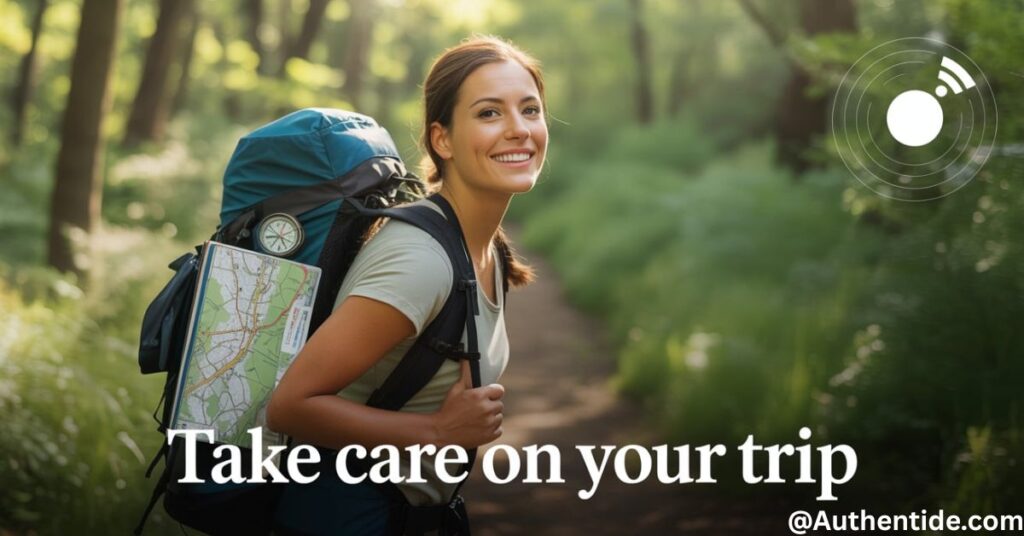
When you want to express concern in a more personal way, “take care on your trip” adds a gentle reminder of caution without sounding overprotective. It works well for parent-child relationships or close friendships.
Example in a text to a young adult: “Your emergency contact info is updated in my phone. Take care on your trip to Thailand, and remember to check in occasionally so I don’t worry too much. Love you!”
Example in a note: “The project documents are ready for your review. Take care on your trip to the mountain office – I hear the roads can be challenging this time of year. Looking forward to your input once you’ve visited the site.”
13. Enjoy your travels
When safety is assumed and you want to focus on the positive experience ahead, “enjoy your travels” shifts emphasis to pleasure and discovery. It’s perfect for vacations, sabbaticals, or other leisure-focused journeys.
Example in a vacation sendoff: “Your neighbor has the spare key and will check on things. Enjoy your travels through Southeast Asia! I’ve bookmarked some hidden gems in Bangkok you shouldn’t miss.”
Example in a work context: “The team will handle all client communications while you’re away. Enjoy your travels to the conference – it’s in New Orleans this year, so don’t miss the jazz clubs after the sessions!”
14. Bon voyage
For a touch of elegance with international flair, “bon voyage” offers a classic alternative that has stood the test of time. This French expression (literally “good journey”) adds sophistication to your farewell.
Example in a goodbye card: “Dear Emma, The office won’t be the same during your sabbatical. Bon voyage as you explore the Mediterranean coast! We look forward to your return with fresh perspectives and renewed energy. Your Marketing Team”
Example in a text: “Just dropped off your mail-held request at the post office. Bon voyage! Send pictures of the Northern Lights if you catch them!”
15. Godspeed
For a more traditional or solemn farewell, particularly for momentous journeys or challenging expeditions, “Godspeed” offers historical gravitas. This time-honored expression conveys both good wishes and an acknowledgment of the journey’s significance.
Example for a career move: “Dear Trevor, As you leave for your new position across the country, know that your contributions here will long be remembered. Godspeed in this new chapter of your career. With appreciation, The Management Team”
Example for an expedition: “The research equipment has been triple-checked and packed. Godspeed on your Antarctic expedition. The whole department will be following your team’s discoveries with great interest.”
16. May your journey be smooth

When you want to offer a blessing-like sentiment that focuses on the quality of travel, “may your journey be smooth” provides a slightly poetic alternative. This phrase works well in cards, formal emails, or meaningful goodbyes.
Example in a farewell note: “Dear Dr. Chen, Your presentation materials have been forwarded to the conference organizers. May your journey be smooth as you represent our institution in Stockholm. With appreciation, The Academic Affairs Office”
Example to family: “The house-sitter has all your instructions. May your journey be smooth as you head to Australia to meet your new grandchild! What a wonderful reason to travel.”
17. Wishing you safe passage
For a more formal or literary tone, “wishing you safe passage” offers an elevated alternative with historical echoes. This phrase works particularly well for sea travel, international journeys, or significant life transitions.
Example for a relocation: “Dear Priya, As you set sail for your new position overseas, know that your impact here remains. Wishing you safe passage to Singapore as you begin this exciting new chapter. With gratitude, Your colleagues”
Example in a personal note: “The travel documents are in the sealed envelope. Wishing you safe passage as you journey to reunite with your family overseas after so long apart.”
18. Travel well
For a concise yet meaningful alternative, “travel well” combines wishes for both safety and quality in just two words. This versatile phrase works for any type of journey and any relationship.
Example in a quick text: “Just checked the weather at your destination – looks perfect! Travel well, and don’t forget to try that restaurant we talked about.”
Example in a business context: “The presentation has been uploaded to the shared drive for your review. Travel well to the client site, and let’s debrief when you return.”
19. May the road rise to meet you
For a poetic, blessing-like farewell with cultural roots, the beginning of this traditional Irish blessing offers a beautiful alternative. “May the road rise to meet you” conveys wishes for favorable conditions and smooth progress.
Example in a farewell card: “Dear Miguel, As you embark on your semester abroad, remember your roots while embracing new horizons. May the road rise to meet you during your time in Ireland. We can’t wait to hear about your adventures! With love, Your Family”
Example in a note: “The project files have been organized for your meetings abroad. May the road rise to meet you as you represent our team internationally. Your preparation has been exceptional.”
20. Stay safe and have fun
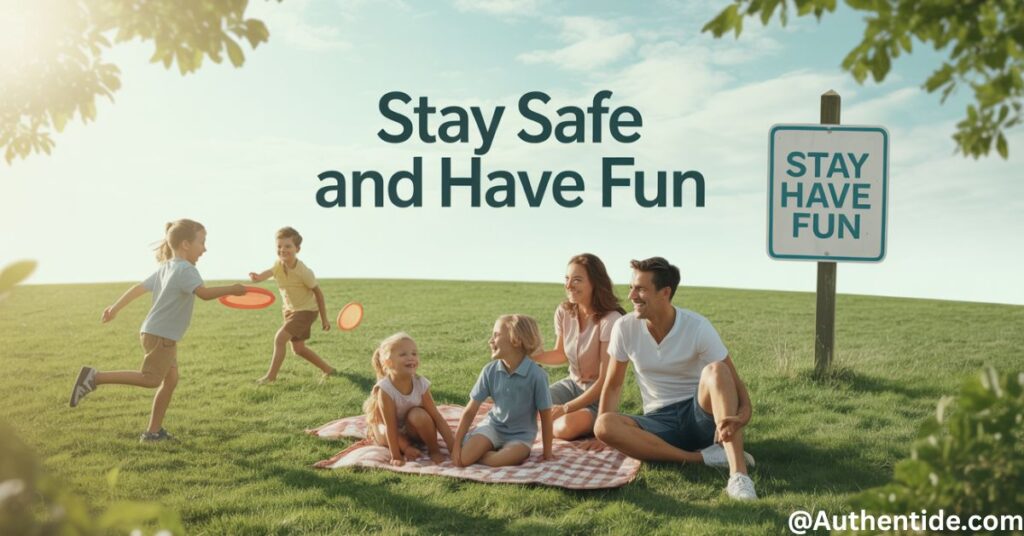
For an everyday, casual expression that covers both safety and enjoyment, “stay safe and have fun” offers the perfect balance. This straightforward phrase works especially well for friends and family heading on vacations.
Example in a text: “Your flight status looks good – no delays! Stay safe and have fun in Costa Rica. The zip-line tours you mentioned sound amazing!”
Example in an email: “Dear Tyler, The conference registration has been confirmed, and I’ve attached your hotel details. Stay safe and have fun in Chicago – I’ve heard the architectural boat tour is worth squeezing in between sessions! Best, Jamie”
Pro Tips for Using Travel Well-Wishes Effectively
When sending someone off with travel well-wishes, context matters tremendously. Here are some professional tips to ensure your farewell hits just the right note:
Match the expression to your relationship. Use more formal phrases like “wishing you safe passage” or “best wishes on your travels” for professional contexts. Save casual expressions like “have a good trip” or “travel safe” for friends and family.
Consider the journey type. For business trips, emphasize safety and smoothness: “have a safe journey” works perfectly. For vacations, focus more on enjoyment with phrases like “enjoy your travels” or “have a pleasant trip“.
Tailor to the traveler’s experience level. For nervous or inexperienced travelers, reassuring phrases like “travel safely” acknowledge their concerns. For seasoned globetrotters, more adventurous expressions like “bon voyage” might be more appreciated.
Adjust for journey significance. For major life relocations or extended trips, more substantial phrases like “Godspeed” or complete Irish blessings acknowledge the moment’s weight. For routine travels, simpler expressions suffice.
Personalize when possible. Rather than just saying “safe journey,” add personalized elements: “Safe journey to Barcelona—I know you’ve been dreaming of seeing Gaudí’s architecture for years!”
Consider cultural appropriateness. While “bon voyage” works internationally, some expressions have cultural or religious connotations. “Godspeed,” for instance, has religious origins that may not resonate with everyone.
Frequently Asked Question
How do you say safe travels in other words?
- Have a safe trip
- Travel safely
- Have a safe journey
- Safe journey
- Bon voyage
- Wishing you safe passage
- Travel well
- May your journey be smooth
- Take care on your trip
- Godspeed
How do you say safe travels in a cute way?
To say “safe travels” in a cute way, you might try:
- Travel safely, my little adventurer!
- Wishing your journey sparkles with safety and fun!
- Fly safe, road warrior! ✈️
- May your path be smooth and your adventures adorable!
- Keep those wheels rolling and your smile glowing!
- Sending safety hugs for all your travels! 🤗
- Adventure safely, my wandering star!
- Stay cozy and careful on your journey! 💫
- Sprinkle safety dust on your traveling shoes!
- Wishing you puppy-level protection on your adventure! 🐶
How do you wish someone a safe trip?
- “Have a safe trip! Text me when you arrive.”
- “Wishing you smooth roads and clear skies on your journey.”
- “Travel safely! I’ll be thinking of you.”
- “May your trip be as safe as it is enjoyable.”
- “Take care and stay safe during your travels.”
- “Sending good vibes for a protected journey.”
- “I hope your travels are worry-free and secure.”
- “Safe passage, my friend! Looking forward to hearing about your adventure.”
- “Keep safe on the road – can’t wait to see you when you return.”
- “Sending you off with wishes for a secure and pleasant journey.”
How do you say safe travels politely?
- “I wish you a safe and pleasant journey.”
- “Wishing you safe passage on your upcoming travels.”
- “May your journey be secure and without incident.”
- “Please have a safe and comfortable trip.”
- “I hope you’ll travel safely to your destination.”
- “Best wishes for a protected and smooth journey ahead.”
- “May I extend my sincere wishes for your safe travels.”
- “I trust your travels will be secure and without complication.”
- “Kindly accept my wishes for your safe journey.”
- “It’s my sincere hope that you’ll have safe and pleasant travels.”
Final Thoughts
The phrases we use to bid farewell to travelers reflect our care and concern, serving as verbal talismans for their journeys ahead. While “safe travels” remains a perfect go-to expression, having these twenty alternatives ready enriches your communication and allows you to tailor your sendoff to specific people and situations.
Whether you are drafting a formal email example to a departing executive or texting a quick goodbye to your spouse leaving for a business trip, the right travel well-wishes can strengthen bonds and express your authentic concern for their wellbeing. The best farewells acknowledge both the practical aspects of journey safety and the emotional significance of temporary separation.

Your go-to place for smart synonyms and celebrity updates. Muhammad Hassan Abid is dedicated to creating useful, engaging content that informs, inspires, and truly serves your curiosity

